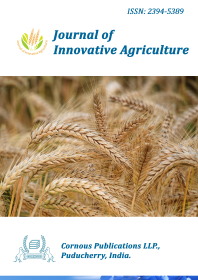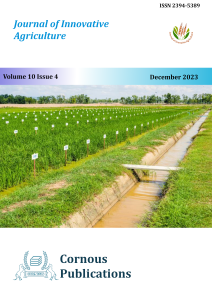
Journal of Innovative Agriculture
Peer Reviewed Open Access Journal
ISSN: 2394-5389 NAAS Rate: 4.05
Submit Manuscript
Peer Reviewed Open Access Journal
ISSN: 2394-5389 NAAS Rate: 4.05
Submit ManuscriptThe majority of the wheat-growing area of Nepal depends upon seasonal rainfall for irrigation. Water scarcity during the critical wheat growing phases has been a major cause of poor production of wheat. To cope with the poor performance of wheat under rainfed conditions, it is crucial to identify the genotype adaptive to moisture-restricted conditions. The experiments were carried out using twenty wheat genotypes in alpha lattice design with two replications under irrigated and rainfed conditions at the Institute of Agriculture and Animal Science (IAAS), Bhairahawa, Rupandehi. The genotypic evaluation was done using the Tolerance Index (TOL), Stress Susceptibility Index (SSI), Yield Stability Index (YSI), Mean Productivity (MP), Geometric Mean Productivity (GMP), and Stress Tolerance Index (STI). Results showed grain yield of wheat was reduced by 64% under rainfed as compared to irrigated conditions. Correlation showed MP, GMP, and STI had a significant positive correlation with yield at irrigated (Yp) and yield at rainfed (Ys). Hence MP, GMP, and STI could be used to identify the high-yielding and stress-tolerant genotypes. The Principal Component Analysis (PCA) and biplot suggested, Nepal Line (NL) 1506 and NL 1508 as high-yielding and stress tolerant wheat genotypes. Hence these genotypes can further be evaluated in plant breeding programs to release as a climate resilient wheat genotype for the overall yield improvement and food and nutritional security of Nepal.
wheat, rainfed, tolerance, adaptive, stress, indices
Adhikari, M., Adhikari, N. R., Sharma, S., Gairhe, J., Bhandari, R. R., & Paudel, S. (2019). Evaluation of drought tolerant rice cultivars using drought tolerant indices under water stress and irrigated condition. American Journal of Climate Change, 8(2), 228–236.
Arora, N. K. (2019). Impact of climate change on agriculture production and its sustainable solutions. Environmental Sustainability, 2(2), 95–96. https://doi.org/10.1007/s42398-019-00078-w.
Bennani, S., Nsarellah, N., Birouk, A., Ouabbou, H., & Tadesse, W. (2016). Effective selection criteria for screening drought tolerant and high yielding bread wheat genotypes. Universal Journal of Agricultural Research, 4(4), 134-142. https://doi.org/10.13189/ujar.2016.040404.
Bennani, S., Nsarellah, N., Jlibene, M., Tadesse, W., Birouk, A., & Ouabbou, H. (2017). Efficiency of drought tolerance indices under different stress severities for bread wheat selection. Australian Journal of Crop Science, 11(4), 395–405. https://doi.org/10.21475/ajcs.17.11.04.pne272.
Devkota, N., & Phuyal, R. K. (2015). Climatic impact on wheat production in Terai of Nepal. Journal of Development and Administrative Studies, 23(1-2), 1-22. https://doi.org/10.3126/jodas.v23i1-2.15445.
Fahad, S., Bajwa, A. A., Nazir, U., Anjum, S. A., Farooq, A., Zohaib, A., ... & Huang, J. (2017). Crop production under drought and heat stress: Plant responses and management options. Frontiers in plant science, 8, 1147. https://doi.org/10.3389/fpls.2017.01147.
Grote, U., Fasse, A., Nguyen, T. T., & Erenstein, O. (2021). Food security and the dynamics of wheat and maize value chains in Africa and Asia. Frontiers in Sustainable Food Systems, 4, 617009. https://doi.org/10.3389/fsufs.2020.617009.
Hafeez, M. B., Raza, A., Zahra, N., Shaukat, K., Akram, M. Z., Iqbal, S., & Basra, S. M. A. (2021). Gene regulation in halophytes in conferring salt tolerance. In Handbook of bioremediation (pp. 341-370). Academic Press. https://doi.org/10.1016/B978-0-12-819382-2.00022-3.
Hooshmandi, B. (2019). Evaluación de la tolerancia al estrés por sequía en genotipos de trigo. Idesia (Arica), 37(2), 37-43.
Khatibi, A., Omrani, S., Omrani, A., Shojaei, S. H., Mousavi, S. M. N., Illés, Á., Bojtor, C., & Nagy, J. (2022). Response of maize hybrids in drought-stress using drought tolerance indices. Water, 14(7), 1012. https://doi.org/10.3390/w14071012.
Khobra, R., Sareen, S., Meena, B. K., Kumar, A., Tiwari, V., & Singh, G. P. (2019). Exploring the traits for lodging tolerance in wheat genotypes: A review. Physiology and Molecular Biology of Plants, 25(3), 589–600. https://doi.org/10.1007/s12298-018-0629-x.
Ministry of Agriculture and Livestock Development (MOALD). (2020). Statistical information in Nepalese agriculture (p. 290). Government of Nepal.
Paudel, B., Wang, Z., Zhang, Y., Rai, M. K., & Paul, P. K. (2021). Climate change and its impacts on farmer’s livelihood in different physiographic regions of the trans-boundary Koshi River Basin, central Himalayas. International Journal of Environmental Research and Public Health, 18(13), 7142. https://doi.org/10.3390/ijerph18137142.
Poudel, P. B., Poudel, M. R., & Puri, R. R. (2021). Evaluation of heat stress tolerance in spring wheat (Triticum aestivum L.) genotypes using stress tolerance indices in western region of Nepal. Journal of Agriculture and Food Research, 5, 100179. https://doi.org/10.1016/j.jafr.2021.100179.
Pour-Aboughadareh, A., Mohammadi, R., Etminan, A., Shooshtari, L., Maleki-Tabrizi, N., & Poczai, P. (2020). Effects of drought stress on some agronomic and morpho-physiological traits in durum wheat genotypes. Sustainability, 12(14), 5610. https://doi.org/10.3390/su12145610.
Regmi, D., Poudel, M. R., K.C., Bishwas., & Poudel, P. B. (2021). Yield stability of different elite wheat lines under drought and irrigated environments using AMMI and GGE biplots. International Journal of Applied Sciences and Biotechnology, 9(2), 98–106. https://doi.org/10.3126/ijasbt.v9i2.38018.
Seleiman, M. F., & Kheir, A. M. S. (2018). Saline soil properties, quality and productivity of wheat grown with bagasse ash and thiourea in different climatic zones. Chemosphere, 193, 538–546. https://doi.org/10.1016/j.chemosphere.2017.11.053.
Shalaby, O. A. E.-S. (2018). Alleviation of salinity stress in red cabbage plants by urea and sulfur applications. Journal of Plant Nutrition, 41(12), 1597–1603.
Sharma, S., Acharya, N. R., Adhikari, S., & Mishra, K. K. (2017). Varietal improvement of wheat under rainfed conditions in mid-western terai of Nepal. Global Journal of Biology, Agriculture and Health Sciences, 6(4), 15–19.
Singh, H., Kumar, P., Kumar, A., Kyriacou, M. C., Colla, G., & Rouphael, Y. (2020). Grafting tomato as a tool to improve salt tolerance. Agronomy, 10(2), 263. https://doi.org/10.3390/agronomy10020263.
Tiwari, D. N., Tripathi, S. R., Tripathi, M. P., Khatri, N., & Bastola, B. R. (2019). Genetic variability and correlation coefficients of major traits in early maturing rice under rainfed lowland environments of Nepal. Advances in Agriculture, 2019(1), 5975901. https://doi.org/10.1155/2019/5975901.
Wieser, H., Koehler, P., & Scherf, K. A. (2020). The two faces of wheat. Frontiers in nutrition, 7, 517313. https://doi.org/10.3389/fnut.2020.517313.
World Bank Group (WBG). (2022). International Journal for Modern Trends in Science and Technology, 8(9).
Zahra, N., Wahid, A., Hafeez, M. B., Ullah, A., Siddique, K. H. M., & Farooq, M. (2021). Grain development in wheat under combined heat and drought stress: Plant responses and management. Environmental and Experimental Botany, 188, 104517. https://doi.org/10.1016/J.ENVEXPBOT.2021.104517.
